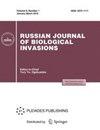ADAPTATION OF ANADARA KAGOSHIMENSIS (TOKUNAGA, 1906) TO HYPO- AND HYPEROSMOTIC ENVIRONMENTAL CONDITIONS: HEMOCYTE RESPONSE
IF 0.6
Q4 ECOLOGY
引用次数: 0
Abstract
Anadara kagoshimensis (Tokunaga, 1906) is an invasive species that has successfully colonized the waters of the Black Sea and the sea of Azov, despite the significantly lower salinity level of these waters in comparison with the native region. The morphological and morphometric characteristics of bivalve mollusk A. kagoshimensis erythrocytes were analyzed by light microscopy during adaptation to hypo- and hyperosmotic experimental conditions. The control group of mollusks was kept at 18‰ salinity. Experimental groups were acclimated to 8, 14, 35 and 45‰ salinity. A decrease of salinity was achieved by diluting seawater with distilled water at a rate of 1.5±0.5‰ per day. Sea salt was added to each aquarium to increase salinity. Salinity was increased at a rate of 2.5±0.5‰ per day. Exposure period was 2 days. It has been shown that the salinity range of 14-35‰ is natural for ark clam. No significant changes in cell morphology were observed under these conditions. At the same time, environmental salinity levels of 8 and 45‰ caused obvious stress: cellular anomalies appeared, and the linear characteristics of erythrocytes were changed. However, cell lysis did not occur, the values of the specific surface area and nuclear-cytoplasmic ratio did not change. The results of the present work indicate the ability of the arc clam to exist for some time in regions with extremely low and high salinity of the aquatic environment.kagoshimensis (tokunaga, 1906)对低渗和高渗环境条件的适应:血细胞反应
Anadara kagoshimensis (Tokunaga, 1906)是一种入侵物种,已经成功地在黑海和亚速海的水域定居,尽管这些水域的盐度水平明显低于原生地区。用光镜分析了双壳类软体动物在低渗和高渗条件下红细胞的形态学和形态计量学特征。对照组软体动物保持在18‰的盐度。试验组分别适应8、14、35、45‰盐度。用蒸馏水以每天1.5±0.5‰的速率稀释海水,达到降低盐度的目的。每个水族箱中都添加了海盐以增加盐度。盐度以每天2.5±0.5‰的速率升高。暴露期为2 d。研究表明,方舟蛤的天然盐度范围为14 ~ 35‰。在这些条件下,细胞形态未见明显变化。同时,8‰和45‰的环境盐度水平造成了明显的应激:细胞出现异常,红细胞线性特征发生改变。然而,细胞没有发生裂解,比表面积和核质比值没有变化。本文的研究结果表明,弧蚌能够在极低和极高盐度的水域生存一段时间。
本文章由计算机程序翻译,如有差异,请以英文原文为准。
求助全文
约1分钟内获得全文
求助全文
来源期刊
CiteScore
1.20
自引率
14.30%
发文量
40
期刊介绍:
Russian Journal of Biological Invasions publishes original scientific papers dealing with biological invasions of alien species in both terrestrial and aquatic ecosystems and covers the following subjects:description of invasion process (theory, modeling, results of observations and experiments): invasion corridors, invasion vectors, invader species adaptations, vulnerability of aboriginal ecosystems;monitoring of invasion process (reports about findings of organisms out of the limits of natural range, propagule pressure assessment, settling dynamics, rates of naturalization);invasion risk assessment; genetic, evolutional, and ecological consequences of biological invasions of alien species; methods, means of hoarding, processing and presentation of applied research data (new developments, modeling, research results, databases) with factual and geoinformation system applications;use of the results of biological invasion research (methods and new basic results) under the study of marine, fresh-water and terrestrial species, populations, communities and ecosystems; control, rational use and eradication of the harmful alien species..

 求助内容:
求助内容: 应助结果提醒方式:
应助结果提醒方式:


